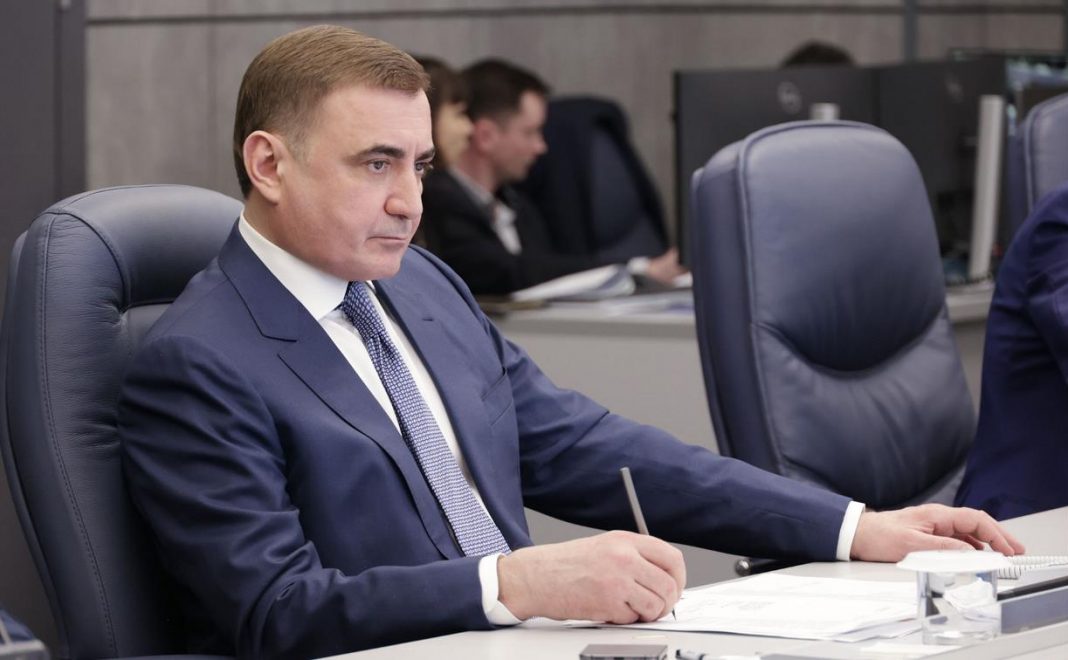Aleksey Gennadyevich Dyumin was born on August 28, 1972 in Kursk. At the time of his, his father, Gennady Vasilievich (born October 8, 1949), was a young medical service officer. Later he was promoted to Major General and headed the 4th Directorate of the Main Military Medical Directorate of the Ministry of Defense. He also led D&D Pharma LLC and was a contact person for several tenders for the supply of medicines and chemicals for the 2nd Central Military Clinical Hospital named after P. V. Mandryka. In the 1990s, Gennady Dyumin was a member of the inner circle of the Minister of Defense of the Russian Federation (1992-1996) Pavel Grachev (in February 1998, Dyumin-Sr. and Pavel Grachev got into an accident in the Ryazan region, which was immediately classified. According to the official version, late at night, the ex-Minister of Defense was going to visit his mother-in-law, who lives in the village of Polyany. On their way, they picked up 33-year-old Elena Musatova, who was standing on the side of the road, and after a few minutes, the Ford skidded into a ditch and turned over. As a result, the woman died, and Gracheva and Dyumin were taken to the intensive care unit with numerous injuries). Mother, Lidia Ivanovna (born April 23, 1949), worked as a teacher. In 1984, another son was born – Artem, now a well-known entrepreneur.
This Content Is Only For Subscribers
In an interview, Aleksey Dyumin recalled that in childhood, he often had to relocate with his parents to some garrisons in Kaluga and Voronezh. They had an unsettled life and even had to live in basements. In Voronezh, Aleksey began playing hockey in the fourth grade and graduated from high school there. At the end of the 10th grade, Aleksey Dyumin was invited to the Buran hockey team in Voronezh. Still, the young man was forced to refuse.
After school, in 1989, Aleksey Dyumin entered the Voronezh Higher Military Engineering School of Radio Electronics (a very prestigious military school where Ivan Kozhedub, Yuri Gagarin, Valentina Tereshkova, Aleksey Leonov and other famous pilots and cosmonauts studied). In 1994, by the time he graduated from college, it became clear that Dyumin was unlikely to become an astronaut. He was sent to serve in the Moscow region in a small garrison.
In an interview with the Kommersant magazine, Dyumin recollected:
“Firstly, when I got to the military unit, I discovered that hot water was flowing from the tap, and they couldn’t close it. Then my senior mentor came. He took out a bottle of alcohol, diluted it with this hot water, and a chemical reaction began. We cut one egg into four slices using fishing line… “Well, drink!” I did. And I heard: “Well, it’s clear you will serve!” Then, when this began to occur systematically, my hair stood on its end … And when a personnel officer advised that I go to the main security department to the presidential communications department, I immediately agreed. They told me: “You will be engaged in ensuring communications for top officials on their trips throughout the country and abroad…” I started working with Viktor Stepanovich Chernomyrdin. A couple of times, there were opportunities to be on a business trip with Boris Nikolayevich Yeltsin… “
Those in the know say, “Dyumin was arranged in the FSO [Russian Federal Security Service – ed.] by his father, who knew General Yuri Krapivin (in 1996-2000 – head of the Federal Security Service).”
In an interview, Dyumin recalled his training in the special forces:
“The emphasis was on psychological preparation, on the ability to master hand-to-hand combat techniques, the ability to use weapons, both individual and group combat, pistols, various machine guns… Nothing unusual: shooting on the move, on the run, from a car, as part of a group… And, generally, I was satisfied that I ended up in this unit and spent quite a lot of time on this particular service. And, of course, the highest aerobatics was when in 1999, I returned from a business trip from the region of Russia. We ensured the visit of Stepashin, the Prime Minister, there. They called me in the evening and said that tomorrow I will join the personal security of Vladimir Vladimirovich. And I ended up in the post of such… let’s say, Putin’s infantryman…”
Dyumin began working in Putin’s security service on the same day that Putin was appointed head of the Russian government. Dyumin speaks very warmly about Viktor Zolotov, who became his first boss in a new field:
“Viktor Vasilievich Zolotov is a man who did a lot in my life, guided my mind. I often was carpeted by him, and there were a couple of moments when he almost kicked me out at all … Sometimes, I just rattled with a sabre… And now he talked to us and said that it would not be easy, that it would be hard… And he said something else. I immediately realised that this is a very strong-spirited commander you can follow to the end. And then, there was a presentation to Vladimir Vladimirovich. He said, “Are you ready?” We told him: “Yes, we are ready; we will work.” And we went on!.. “.
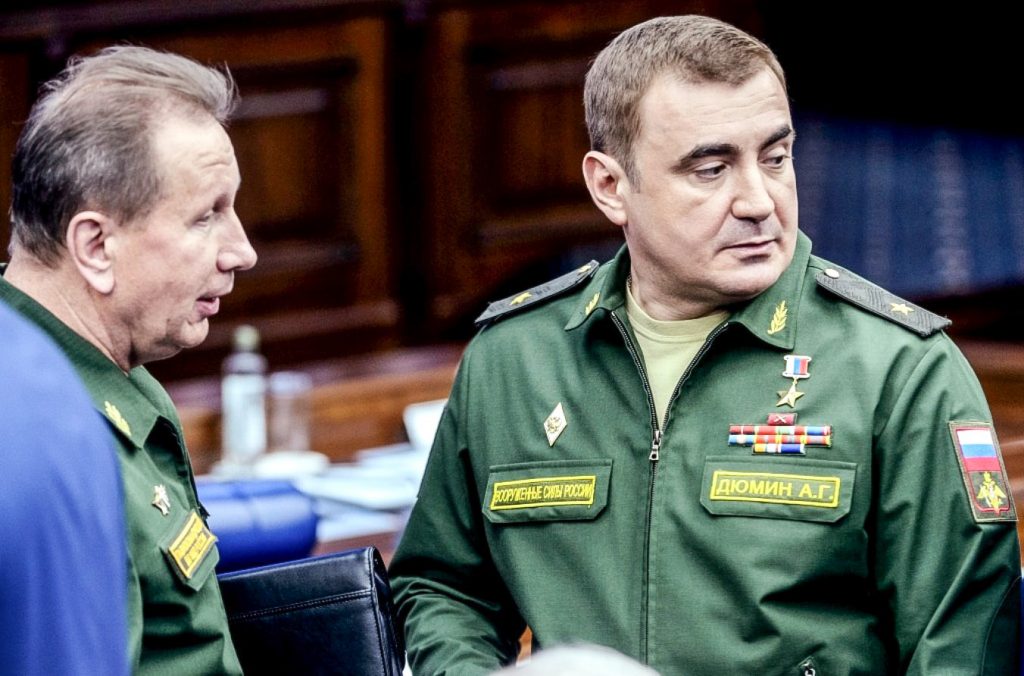
Serving as Putin’s security guard, he attracted the attention of journalists because Dyumin was the closest to the president and literally supported him when the press service organised risky filming. At some point, Dyumin gained the reputation of “Putin’s adjutant.” He said:
“They say about me that I was an adjutant, but I have never been. Innately, I walked along a certain staircase and was never an adjutant. An adjutant is such a caste of chosen people… I was part of a group of officers who ensured security in Russia and abroad, everywhere… Well, I was like all of us… We were chosen, did what we had to do, and fulfilled the tasks set before us. Well, the last thing I achieved in this area: I was appointed the deputy head of the security department of the head of the government, the president, and then again the head of the government…“
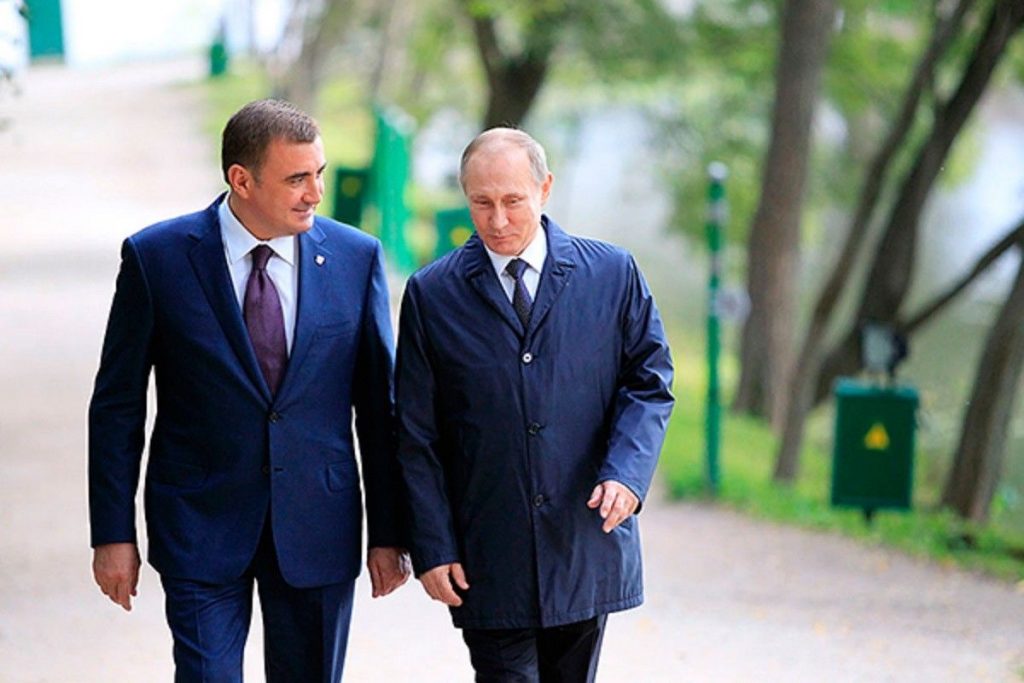
At the same time, even the Wikipedia article gives information about Dyumin being an adjutant.
Proximity and patronage from Putin were ensured mainly by common interests: like Putin, Dyumin was fond of hockey (later, Dyumin even headed the Board of Trustees of the Night Hockey League, initiated by Putin). Dyumin usually played as a goalkeeper; he acted as Putin’s sparring partner during sports, deflecting throws. This distinguished Dyumin from other security guards and contributed to his career growth.
Later, Dyumin, along with Sergei Shoigu and former Russian Interior Minister Rashid Nurgaliev, played in the Breeze amateur hockey club.

The love of hockey brought Dyumin closer to the influential Rotenberg family, who (along with Zlotov) became one of the career growth drivers of the young presidential guard. The Rotenbergs introduced Dyumin into the circle of confidants of Prime Minister Zubkov.
In 2007, a promising and responsible employee was appointed head of security for Prime Minister Zubkov. When Putin became the chairman of the executive branch of power, Aleksey acquired the status of a person especially close to the prime minister. He accompanied him everywhere, sitting in the car’s front seat. If necessary, he spent nights at the Novo-Ogaryovskaya residence and carried out official and private assignments. Then he became the head of the Presidential Security Service, whose employees were exclusively engaged in ensuring the security of Vladimir Vladimirovich.
In 2009, at the Russian Academy of Public Administration under the President of the Russian Federation, Dyumin defended his PhD.
In September 2013, the head of the Presidential Security Service, General Zolotov, fell into temporary disgrace. He was accused of corrupt ties with Senator Sabadash. Then the director of the Federal Security Service, Yevgeny Murov, security officials from Lubyanka and presidential aide Yevgeny Shkolov (who was involved in personnel policy) actively played against Zolotov and a group of adjutants. Zolotov’s departure (appointed Deputy Commander-in-Chief of the Internal Troops) led to personnel changes in the Security Service.
In 2014, Dyumin was deputy head of the Main Intelligence Directorate and commander of the Russian special operations forces, which played one of the key roles in the Crimea annexation operation, as shown in the “Crimea. Way to the Motherland” movie, directed by Andrey Kondrashov. According to the Kommersant newspaper, Dyumin designed and carried out an emergency evacuation operation to Russia for Ukrainian President Viktor Yanukovych on the night of February 23, 2014. Dyumin himself called it a myth and refused to comment. At the same time, Dyumin speaks very dismissively about Yanukovych.
Although Dyumin actively denies his participation in special operations on seizing Crimea and evacuating Yanukovych, in the spring of 2014, Aleksey Dyumin was awarded the “Hero of the Russian Federation” honorary title by a closed President Putin’s decree.
In a famous interview given to Andrey Kolesnikov, Dyumin tells about the special operations forces:
“This is a reasonably serious squad, one might say; this is an officer squad… And the area of action of the special operations forces is the whole world. These are highly educated, highly trained, professional guys who know one or two foreign languages, have special training, and can operate independently and as part of groups. And it is a very closed squad. I am proud that I headed it; there are genuine officers and a sense of elbow, honour, dignity and the fulfilment of tasks at any cost, up t … I don’t know how to say.”
Since 2015 he has been a Chief of the Main Staff of the Ground Forces – the First Deputy Commander-in-Chief of the Ground Forces (replaced Colonel General Sergei Istrakov). On December 11, 2015, he was awarded the military rank of lieutenant general.
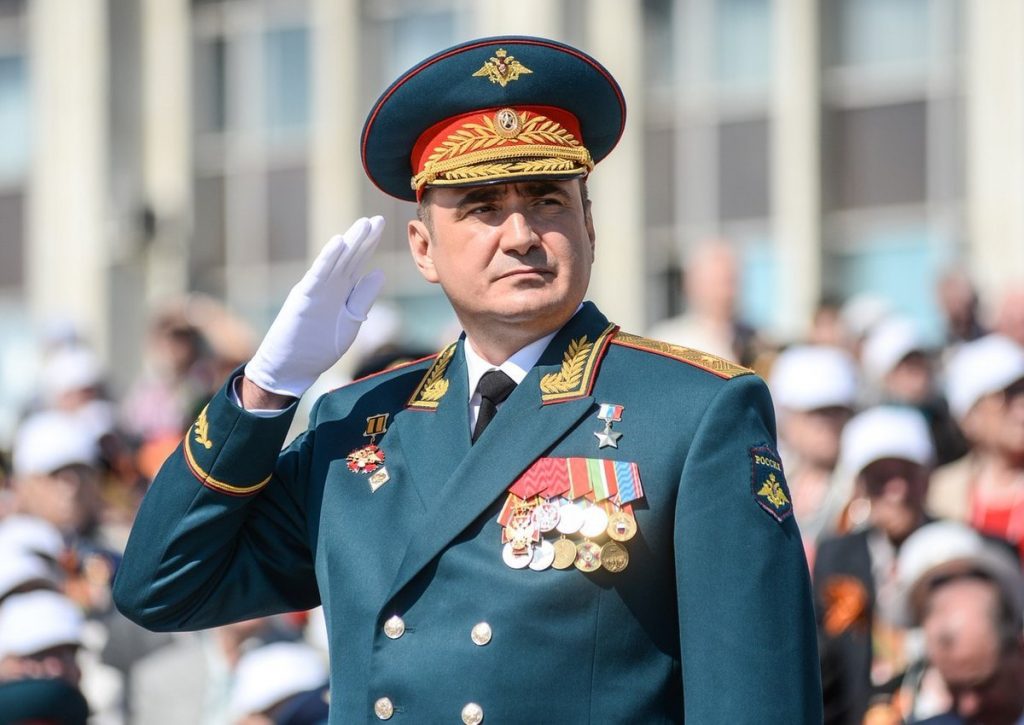
On December 24, 2015, by decree of the President of Russia, he was appointed Deputy Minister of Defense of Russia. Dyumin became a member of the collegium of the Ministry of Defense. In this role, he oversaw combat training and the department’s economy: the construction department, housing provision for military personnel, military medicine, and the department of property relations.
“The Minister of Defense called me and said that it was his decision and that he had agreed his decision with the Supreme Commander. And he offers me to take the Deputy Minister of Defense post. Well, I tried not to refuse; I tried to discuss. How the decision was made, etc. In such a harsh form, I was told that the decision had been made and the verdict was not subject to appeal. But we must pay tribute to Sergei Kuzhugetovich. He saw my condition, saw my eyes and requested the staff to bring me 50 grams of cognac from the reception … Well, not 50, but even 100. This is even though the ministry has dry law…”
He has been in this position for a little over a month. The New York Times wrote in 2016:
“Dyumin is an outstanding coordinator between the army, the FSB, the GRU and the Ministry of Internal Affairs during acute situations,” a Defense Ministry official told an NYT correspondent anonymously. “And he promptly reported everything to the top.” – “Are you saying that the general was Putin’s eyes and ears in the Ministry of Defense?” – “Undoubtedly.” Unsurprisingly that the army was frosty about Dyumin.”
On February 2, 2016, by decree of the President of the Russian Federation, he was appointed Acting Governor of the Tula Region. In this position, he replaced Vladimir Gruzdev, who left the post of his free will. His dismissal was caused by a criminal case against Maxim Mishchenko’s closest assistant and an investigation due to the inappropriate allocation of grants for 3 billion rubles in favour of the Medved Trade House and the Baltika company. On December 6, 2016, the Arbitration Court of the Voronezh Region, in the reasoning part of its decision, indicated that during the governorship, Gruzdev, in violation of the law, continued to engage in entrepreneurial activities and was directly involved in the management of the Modny Continent company. For Dyumin himself, the appointment was unexpected. On February 9, he announced plans to participate in the election of the governor of the Tula region on a single voting day on September 18, 2016.
By the way, the transfer of powers from Gruzdev to Dyumin went absolutely smoothly and without conflict. Gruzdev remained Dyumin’s adviser for six months, bringing him up to date.

On September 18, 2016, direct gubernatorial elections were held in the Tula region for the first time in 15 years. Dyumin won 84.19% of the vote. The appointment took place on September 22, 2016.
From July 18, 2018, to January 28, 2019, and from December 21, 2020, he was a Member of the Presidium of the State Council of the Russian Federation.
In the 2021 gubernatorial election, Dyumin was re-elected for a new term with 83.6% of the vote.
In December 2021, by a closed decree of the President of the Russian Federation, Dyumin was awarded the following military rank of Colonel General.
At the end of 2022, Aleksey Dyumin was in second place in the Russian regions’ heads ranking, becoming a figure in great demand and often mentioned among analysts.
Proximity to Putin also determines the special status of Dyumin among the heads of the subjects of the federation. Obviously, it is easier for him to resolve issues regarding allocating funds from the federal budget to develop regional programs. The official biography of the governor of the Tula region is a list of continuous victories and achievements.
By the way, Dyumin’s success is also determined by the fact that his predecessor, Gruzdev, formed intense prerequisites for the stable development of the region. By the time of Dyumin’s appointment, the region came out on top in the Central Federal District regarding growth in actual income. Economic growth made it possible to reduce borrowing from the federal budget by 2 billion rubles. The debt burden (the ratio of the volume of public debt to tax and non-tax revenues) decreased from 37% to 32%. According to this indicator, the region rose in the Central Federal District from 7th place in 2010 to 4th place in 2014, and in Russia – from 49th place to 16th. In 2010-2014, the region’s consolidated (including municipal revenues) budget increased by 85% from 34.5 to 63.7 billion, and the regional budget’s own revenues more than doubled – from 23.2 to 50 billion.
In 2011-2015, the Tula region increased the dynamics of industrial production by 51.5%. It took 2nd place in this indicator in the Central Federal District and 5th place in Russia. The volume of investments in fixed capital for 2011-2015 amounted to 348 billion rubles; their share in the gross regional product in 2014 reached 26.4%, almost catching up with the planned figure for 2018 of 27%. Economic growth decreased unemployment from 5.3% in 2011 to 4.1% in 2015 (15th and 7th place in the country, respectively).
The average salary increased from 17.3 thousand rubles in 2011 to 26.8 thousand rubles in December 2015 (48th and 40th place in the country), and in educational institutions, the growth reached 200-250%. During Gruzdev’s work, the region has achieved a record rate of housing construction for 25 years. Between 2011 and 2015, 1.7 million m² of housing was commissioned in the region, with twice as much commissioning as before. Regarding the growth rate of the housing stock, the Tula region took 6th place in the Central Federal District and 32nd place in Russia, and in resettlement volumes, it took 1st place in the federal district and 7th place in the country.
Therefore, we can confidently say: Dyumin got not just a prosperous but an exemplary region, and his task was “to do no harm.” Wikipedia gives the following areas in which the Tula region showed success in development during Dyumin’s governorship:
The Kazanskaya Embankment was built, and the Museum Quarter was organised on Metallistov Street, which includes branches of four federal museums (including the State Historical Museum), two regional and two private museums. Thanks to them, the centre of Tula acquired the features of a single cultural and tourist space.
Repaired and restored 70 cultural objects. A dam, a cascade of ponds and a new embankment of the Bobrinsky Palace Museum have been restored in Bogoroditsk. Within four years, Platonovsky Park in Tula turned from an abandoned forest into a well-maintained urban space.
Following the results of the St. Petersburg International Economic Forum 2021, the Tula Region is included in the Big Golden Ring of Russia.
If in 2016 580 thousand people visited the region, then in 2019, the number exceeded a million. According to the hoteliers’ estimates, the tourist flow to the Tula region has grown by 10% annually over the past five years. Forbes Life says Tula is in Russia’s top 10 most promising cities.
On September 1, 2018, a new school for 600 students opened in Tula for the first time in decades.
In five years, 16 new kindergartens have opened their doors. Two centres for gifted children have been built. 23 mini-technoparks, 3 technoparks, Quantorium, and “IT-cube” were opened.
Since 2019, rural schools have begun creating the “Points of Growth” — specially equipped educational centres for digital and humanitarian profiles.
In four months, an unprecedentedly short time, the Suvorov School in Tula was revived, which is currently, according to some estimates, the best in Russia.
At the governor’s initiative, research and production companies have been created at two Tula enterprises, allowing conscript students to do military service without interrupting their studies and the region to retain the young cadres that the industry needs.
For the first time in 10 years, large-scale healthcare facilities have been built in the region – two new buildings of the Tula Children’s Regional Hospital.
The fleet of fully equipped ambulances has been updated. Now it is considered one of the “youngest” in the Central Federal District. An air ambulance helicopter appeared.
More than 1 billion rubles were spent on constructing and repairing medical facilities (27 polyclinics, 15 hospitals, 81 FAPs). A vascular centre has been opened, and perinatal and oncological centres are being constructed.
The Ice Arena in Novomoskovsk, the Vedenino ski-roller centre on Kosaya Gora, the unique Ice Palace in Tula, and seven sports and recreation centres were built. Another 25 multifunctional sports grounds are planned to be opened in 2021. The construction of a modern sports complex on the Kaluga Highway goes on.
During 2016-2021, 111 investment agreements were concluded, with a total investment of more than 500 billion rubles and providing more than 14,600 new jobs.
The special economic zone “Uzlovaya” and the “Haveil Motor Manufacturing Rus” car production were launched. Investments in the Haval car factory amounted to USD 500 million, and the productivity of the new enterprise is 150,000 cars per year. In 2019, a new metallurgical plant, “Tulachermet-Stal”, was launched. The volume of exports of Tula agricultural products over the past five years has increased by 2.5 times.
The Tula region steadily takes a leading position in the “National rating of the Investment Climate State in the regions of the Russian Federation”, and in 2020, it skyrocketed to the 3rd place.
During the St. Petersburg International Economic Forum 2021, Aleksey Dyumin signed 26 agreements on implementing investment projects in the Tula Region worth more than 150 billion rubles, creating almost 4,000 new jobs in the region. Among them are five agreements in the agro-industrial complex (48 billion rubles, 2,000 jobs).
In 2021, Dyumin outlined the creation of a single transport agglomeration of the region with Moscow as one of the priorities for developing the economic potential of the Tula region. In particular, he set the task of developing a project to construct a high-speed railway between Tula and Moscow, which will allow travel between cities in 55 minutes.
Understandably, such achievements cause envy among his fellow governors. In addition, Aleksey Dyumin is one of the few Russian governors who can, breaking the command chain, resolve matters with Moscow directly, bypassing the presidential representative in the Central Federal District, Igor Shchegolev, who is undoubtedly a weaker figure than Dyumin, being his formal supervisor.
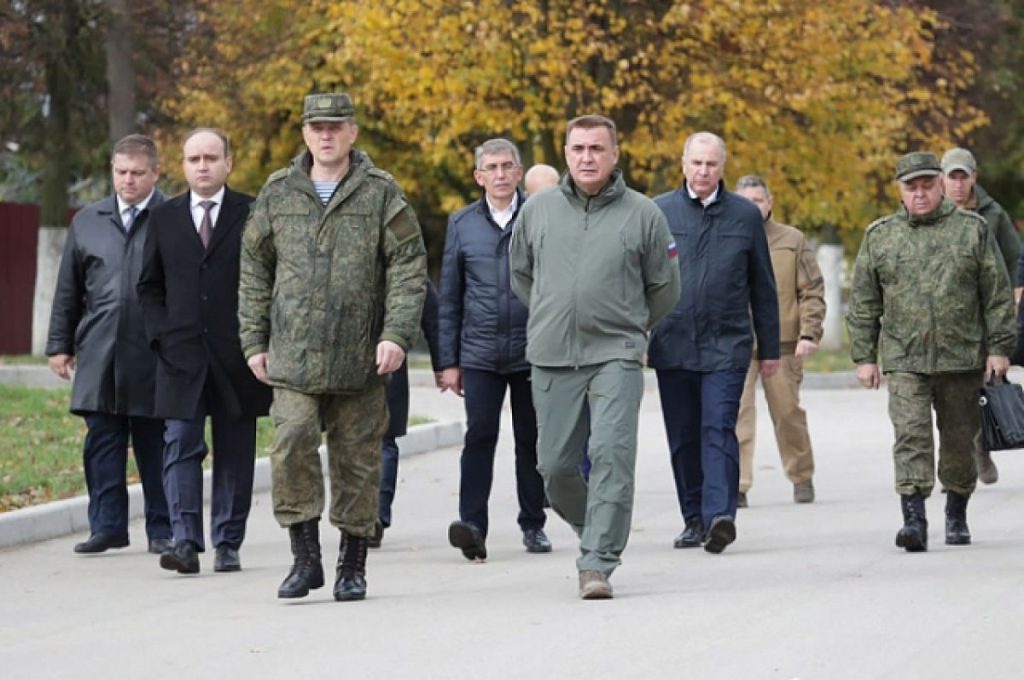
The New York Times was the first to put forward the version that Dyumin could potentially be considered as Putin’s successor:
“It is still unclear what caused such a rapid transfer of the general to Tula. Indeed, the military-industrial complex is the main engine for today’s region’s development, and Dyumin probably possesses many types of modern arms. However, this does not help much in solving the problem of leaking pipes and freezing radiators, which, jointly with other housing and communal services problems, are the main headache for any governor. Conspiracy theorists, however, quickly suggested that Putin sees Dyumin as a potential successor to solve the 2018 problem when the current president has to decide whether to leave or stay. Dyumin is personally devoted: being the president’s adjutant for special assignments, he is said to have slept in the same house as the president in Novo-Ogaryovo and is ready to solve non-trivial tasks. He took Yanukovych out of Crimea, and he has some knowledge of international politics: at least, he read his theses on the G8. Besides, in the next two years, he will get micromanagement skills: the technology using which Putin controls Russia. It is impossible not to notice: Boris Yeltsin began to choose his possible successors in the spring of 1998, 2 years before retiring. And suppose the version of conspiracy theorists is justified. In that case, Putin is entering the same two-year marathon: finishing in March 2018. If, of course, this finish will be.”
In August 2017, experts of the Petersburg Politics Foundation positioned Dyumin in third place in the ranking of Putin’s potential successors, after Dmitry Medvedev and Sergei Sobyanin. Among the reasons for Dyumin’s elevated position were his personal closeness and devotion to Putin, which arose while working as an adjutant-bodyguard in the Presidential Security Service, as well as the social demand existing in Russian society for the emergence of a “fresh” statesman who is not included in the established circle of top officials of Russia.
At the end of December 2020, LDPR leader Vladimir Zhirinovsky named Dyumin one of the politicians who could become Vladimir Putin’s successor as the president of the Russian Federation.
At the same time, information is occasionally thrown in the media about the possible Dyumin’s appointment to a specific government position: from the Minister of Emergency Situations to the Prime Minister. According to one of the latest versions, Dyumin can be considered among the candidates for the FSB director position. Recently, Dyumin has been actively considered for the post of Minister of Defense.
In 2018, one of the Telegram channels stated:
“In 2015, the Rotenbergs came up with the “heir general” project and began to “push” Dyumin everywhere. Dyumin’s candidacy always made the President smile. Few people believe in the administrative qualities of Dyumin. It’s one thing to arrange a table, tell stories and sing songs; the other is to manage and take responsibility. The fact that the topic of “combat general Dyumin” is being promoted so much once again demonstrates his weaknesses: the lack of a strong-willed core and the ability to crush and turn off emotions. Dyumin is too human to become an icon of the security forces. Simply divide everything by five or ten when speaking about forecasts regarding Dyumin. The Rotenbergs have been selling the “Dyumin Project” for three years now. However, the Rotenbergs do not inject their own money. For this, there are “Chechen budgets”, the budgets of Zolotov and Chemezov, and “money near Moscow”.
Interestingly, the notorious socialite Tina Kandelaki was the main driver of the “Dyumin for Successor” campaign.
According to those who know Dyumin, the governor has a cheerful disposition; he loves life and is a sybarite.
According to one of his colleagues, “Dyumin is an excellent person: a joker, the soul of the company, and a decent person. But he has absolutely no managerial skills. Dyumin is strong as long as he does not interfere in the process and as long as the attached team controls him.
Another acquaintance of Dyumin characterises him as a person “who has always pursued his career”: “He is a pure careerist and ever rushed home from work. He always fulfilled the assigned tasks at any cost.”
As ex-employees of the FSO joked, that in their institution, Aleksey Dyumin has been jokingly named “the reincarnation of Koni, the Labrador” (Putin’s favourite dog in the ’00s).
At the same time, many experts (in particular, Evgeny Minchenko) tend to attribute Dyumin to the new elite in law enforcement agencies, along with such figures as Sergei Korolev, Evgeny Zinichev, Dmitry Mironov, Igor Babushkin, Mikhail Babich.
No high-profile scandals existed regarding Dyumin’s real estate, income or property. It is known that he has a land plot in the hills near Moscow. Also, at the beginning of 2023, he bought a344 sq m apartment in Moscow in an elite complex on Kolymanny Lane, 10. It is known that this apartment previously was owned by the famous Georgian economist Kakha Bendukidze. According to rumours, an unspecified Kazakh businessman presented this apartment to Dyumin.
On April 6, 2018, Dyumin was included in the “Kremlin” US sanctions list jointly with 17 Russian officials and 7 businessmen, who are close to Russian President Vladimir Putin.
On March 15, 2019, Canada imposed sanctions against Dyumin due to Russia’s “aggressive actions” in the Black Sea and the Kerch Strait, as well as the annexation of Crimea.
On June 24, 2021, Ukraine added Dyumin to the sanctions list, noting that, according to media reports, he led the “rescue-evacuation” of Yanukovych and the following seizure of Crimea.
On February 24, 2023, due to Russia’s full-scale invasion of Ukraine, he was included in the UK sanctions list as “a former guard of Putin who played a key role in the annexation of Crimea.”
During Yevgeny Prigozhin’s “Justice march”, an attempted military riot in Russia, Aleksey Dyumin was actively mentioned as one of the negotiators between Prigozhin and the Kremlin. In fact, he denies this. According to official data, the talks were led by Alexander Lukashenko.
Immediately after the results of the negotiations were announced, information began to spread actively that shortly, Aleksey Dyumin should replace Sergei Shoigu as Minister of Defense of the Russian Federation. At the same time, currently, this statement is nothing more than a rumour. None of Ascolta’s sources reported that such a decision was made at the highest level. It is important to note that such activity around Dyumin can play against him.
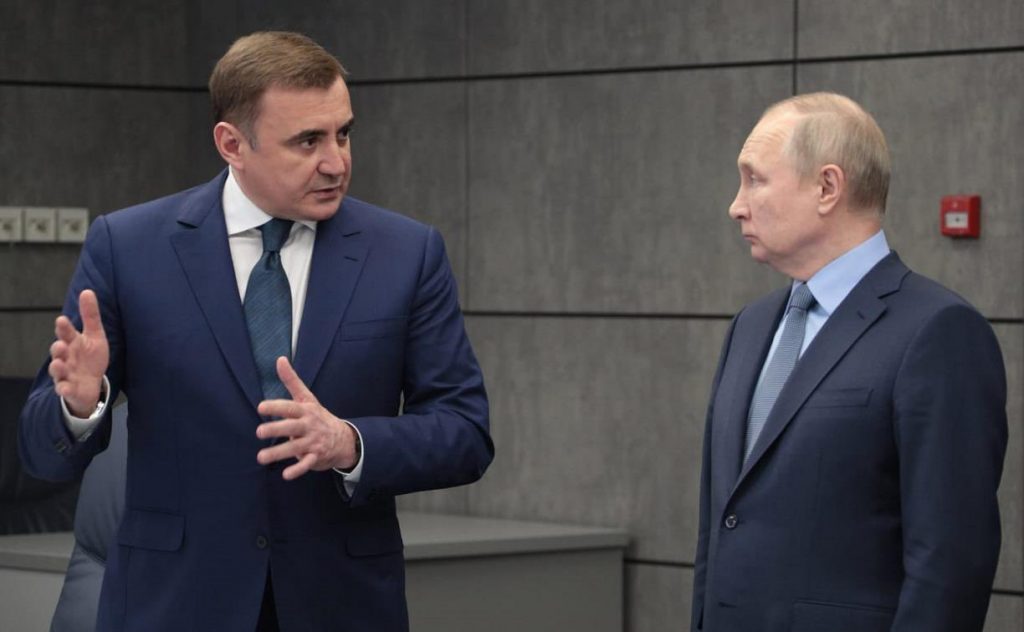
In addition to hockey, he enjoys swimming and cycling across rough terrain and plays big and table tennis.
Aleksey Dyumin is married. His wife, Olga Yaroslavovna, was born on January 8, 1977, in Moscow, where her parents moved from Kyiv just before the birth of their daughter. Native Ukrainian. Dyumin met her during a walk through VDNKh [Moscow-based permanent amusement park – ed.]. Dyumin recalled:
“We went to VDNKh with a group of mates; she was with a group of friends… It was some summer holiday, I don’t remember the exact one… There were cute girls… I thought it would be an episode, but it turned out that it was not one.”
Olga gives her interpretation of this matter: “It was in spring, in May. I was twenty, and he was twenty-five. My girlfriend and I walked around VDNKh, and he was with his friends there. “Hey girls, how are you?” We got acquainted. Then they exchanged phone numbers in a cafe. Back then, there were no mobile phones. I gave him my home phone number, and he left me the number of his bleeper. Of course, he contacted me first, very quickly. We started dating. Five years later, we got married. We wanted to proceed without a magnificent wedding, just do the paperwork quietly on a weekday. It did not work out: our parents insisted that there should be a wedding like everyone else. But I was pleased because this is an event for life. By the way, I have an excellent relationship with Aleksey’s parents and vice versa. So, these stories and jokes about problematic relationships between son-in-law and mother-in-law, daughter-in-law and husband’s mother are not all about us.”
In 2002 they got married. Olga Dyumina has an economic education and speaks foreign languages. She goes in for sports, particularly running: she participates in marathons and runs long and short distances. She takes part in 5-7 kilometres charity runs.
In June 2004, the couple had a son, Nikita (in official biographies, the birth year is 2005; vicious tongues claim that Dyumin amended the birth date to let his son to avoid mobilisation). He graduated from high school with an in-depth study of mathematics. Now he is a student at the Higher School of Economics. He is fond of chess, yachting, wake surfing, and football (he was a forward of FC Khamovniki for several years).
The younger brother of Aleksey Dyumin, Artem Dyumin, is a well-known Moscow businessman and developer. Initially, he worked at a representative office of the French Sanofi, then as a general director at OAO TPK Prodmarket and LLC Turbo, and in MFC LLC, located at Varvarka, 14, since 2014. According to Moscow media, the commercial and industrial company Prodmarket was the sole contractor and developer of the five-star Zaryadye Hotel, which is part of the cognominal park built on the site of the demolished Rossiya Hotel.
Artem Dyumin’s business partner is Oleg Golublev, whose father was head of Vladimir Putin’s office. Until recently, Dyumin and Golublev had another partner. It was a well-known lawyer and investor Dmitry Shumkov, who suddenly committed suicide in December 2016 by hanging himself in his office in the Federation Tower. According to sources, “Shumkov teared apart with his business partners and friendly officials who helped him implement key development projects and was in total despair.” So, the same sources point to Shumkov’s unsuccessful purchase of a 91.5% stake in the “Olimpiyskiy” sports complex worth $50 million. Before the deal, the businessman announced that he was going to make a second Madison Square Garden out of “Olimpiyskiy”. However, the widely advertised project turned out to be unprofitable, and the necessary funds for reconstruction were not collected. According to the “Spark-Interfax” database, the “Olimpiyskiy” sports complex is currently headed by Artem Dyumin.

